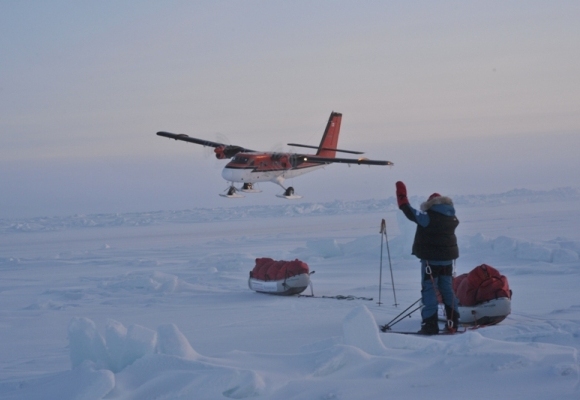Bermuda Sponsored Explorers in The Arctic Ocean
Sponsored by a Bermuda based insurance company, a team of veteran polar explorers began an approximate 500-kilometre trek across the floating sea ice of the Arctic Ocean as part of Catlin Arctic Survey 2010 yesterday.
The international scientific mission’s purpose is to learn how increased carbon emissions could be affecting the seawater of the Ocean.
-
The Catlin Arctic Survey is sponsored for the second consecutive year by Catlin Group Limited, an international specialty insurer and reinsurer headquartered in Bermuda.
Today, weather permitting, a team of research scientists will be flown to a purpose-built “Ice Base” which will become their home for the next 45 days.
The Ice Base is located at 78°45’N 103°30’W on the shore of Ellef Rignes Island, only 750 miles from the North Geographic Pole. It will provide living, dining, research and communications facilities under the supervision of experienced polar guides.
Video Preview of the 2010 Expedition:
The Twin Otter plane carrying the Explorer Team successfully landed on the ice late on Sunday at 86°N 80°W following a six-hour flight from Resolute. The explorers will today begin their scientific work by heading northwards across the rugged sea ice, measuring its thickness and taking samples of the seawater beneath the ice.
The Catlin Arctic Survey is a unique collaboration between explorers and research scientists to gather data in the inhospitable conditions of an Arctic winter. This year’s survey will focus on the potential impact of rising levels of carbon dioxide (‘CO2‘) in the Arctic Ocean, including ocean acidification. There is a need for much more information about any changes in the Arctic Ocean, especially as CO2 is more readily absorbed in cold water and could act as a barometer for possible changes in other regions.
The explorers are Anne Daniels, Charlie Paton and Martin Hartley.
2010 Pre-Expedition Explorer Team Interviews:
Some scientists believe that, based on current projections, the pH of the world’s oceans could reach levels by 2050 not seen on Earth for 20 million years. If this occurs, there could be serious consequences for marine life in the Arctic and elsewhere.
During the Survey, both teams will be facing temperatures as low as minus-45C with wind-chill factors as bitter as minus-75C.
During the expedition the team will be sending video, reports and photos to show what it takes to capture data under the extreme condition of the Arctic Ocean.
For further information see Catlinarcticsurvey.com, or Martinhartleypolar.com.
Read More About
Category: All, Business, Environment


